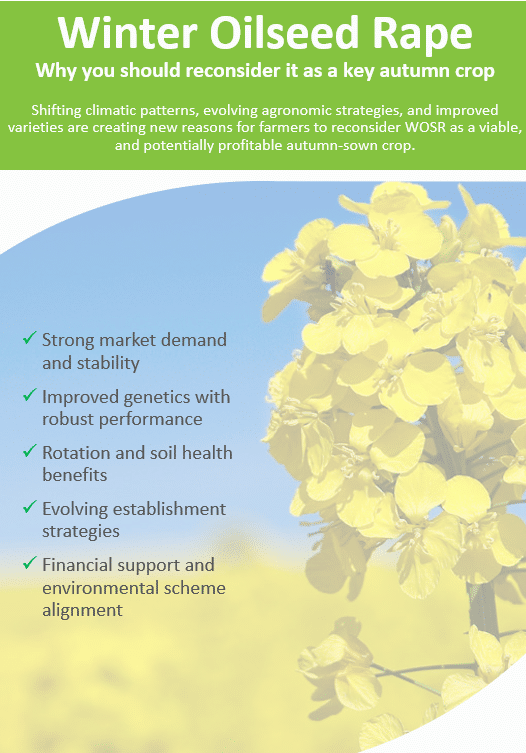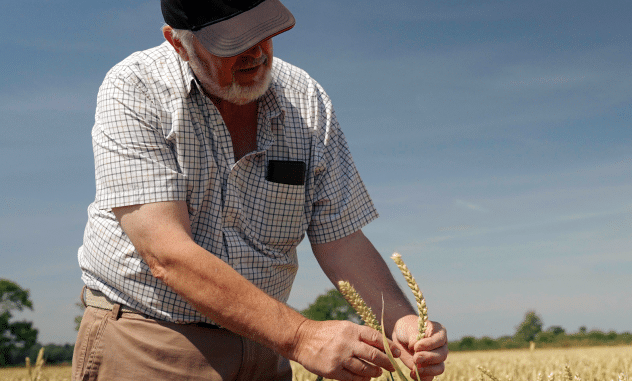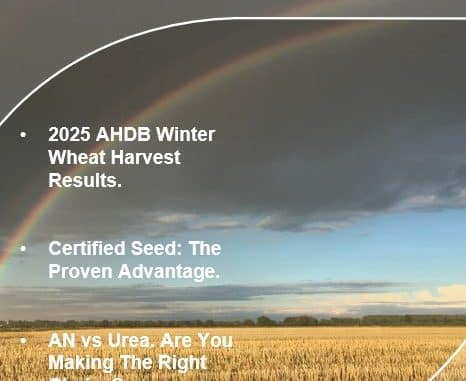Call our seed specialists with any queries you may have on 01427 421200, option 5 or speak with your Farm Trader.

In recent years, winter oilseed rape (WOSR) has faced fluctuating popularity among UK farmers. Once a cornerstone of arable rotations, its fortunes have declined due to concerns about pest pressure, weather challenges, and crop failure risks. However, shifting climatic patterns, evolving agronomic strategies, and improved varieties are creating new reasons for farmers to reconsider WOSR as a viable, and potentially profitable autumn-sown crop.
Looking Past Recent Declines
The decline in WOSR acreage across the UK has been significant since the 2013 ban on neonicotinoid seed treatments, which were essential for controlling cabbage stem flea beetle (CSFB), a major pest. The pest’s larval feeding has become a pressing challenge for WOSR, and the perceived risk of crop failure has pushed farmers to alternative break crops like beans, oats, or even forgoing break crops entirely in favour of other options under the Sustainable Farming Incentive (SFI).
Despite these challenges, WOSR still holds a unique place in UK arable systems and deserves to be reassessed as a key crop for autumn planting.
Why Reconsider WOSR Now?
Strong Market Demand and Stability
Global demand for oilseeds remains strong, with rapeseed oil in high demand for both food and biofuel markets. Volatility in global grain markets, exacerbated by geopolitical tensions and climate disruptions, has highlighted the importance of crop diversity and price resilience. WOSR continues to offer attractive market prices, especially for farmers able to achieve good yields. The UK’s domestic crushing capacity, such as ADM’s Erith plant, ensures a stable, local market, and there are contracts available for growing varieties with special oil profiles, such as High-Oleic/Low Linoleic (HOLL) varieties.
Improved Genetics with Robust Performance
Plant breeders have made significant strides in developing WOSR varieties with enhanced vigour, in the autumn and particularly important in spring. These varieties exhibit improved resistance to late-season stem diseases, such as light leaf spot, stem canker, and verticillium wilt, particularly in varieties featuring RlmS, such as Maverick and the new variety Karat. Additionally, pod-shatter resistant varieties like LG Academic and DK Excited, along with new varieties such as Hinsta from KWS, spread risk and help reduce harvest losses in the event of hailstorms or other climatic events.
Advances in clubroot-resistant genetics, such as the variety Crusoe, and turnip yellows virus (TuYV) resistance are providing added security, particularly in higher-risk regions. These improvements help make WOSR more reliable and increase its yield potential.
Rotation and Soil Health Benefits
WOSR plays a crucial role in diversifying cereal-dominated rotations. Its deep tap roots improve soil structure and drainage, while its early harvest allows for timely cultivation and workload distribution. By rotating crops, farmers can reduce pressure from diseases like take-all in cereals and benefit from rotational synergies, such as increased nitrogen availability for following wheat crops.
Evolving Establishment Strategies
Farmers have adapted their agronomic strategies to better manage CSFB and optimise WOSR establishment. These strategies include:
Drilling Date: Earlier sowing to give crops a head start before peak beetle migration has been successful for some growers. However, awareness of disease risks, such as verticillium and clubroot, is critical. Alternatively, later sowing—into early-mid September (location dependant), as climate change brings milder autumns—allowing crops to reach the 8-10 leaf stage pre-winter, leading to improved establishment.
Companion Cropping: Using crops like buckwheat, berseem clover and fenugreek alongside WOSR can confuse pests and improve soil structure, contributing to healthier crop establishment.
These innovative practices show that, with proper planning and timing, WOSR can be successfully established even in areas previously considered high-risk.
Financial Support and Environmental Scheme Alignment
Government schemes, like the Sustainable Farming Incentive (SFI), offer support for sustainable practices that align with WOSR production, such as cover cropping, minimal tillage, and integrated pest management. Many WOSR varieties now come with risk-sharing and establishment schemes, backed by plant breeders, to help reduce exposure to crop failure. For example, varieties like Duplo offer flexible sowing options and support if conditions are not favourable.
The gross margin of WOSR remains strong, making it one of the most profitable crops in diverse farming systems. In some cases, growers can take advantage of positive market prices, potentially reducing the acreage dedicated to SFI schemes like NUM3, which have led to productive arable land being taken out of production.
Making the Decision: A Case-by-Case Basis
Of course, WOSR won’t be right for every farm. Factors such as soil type, previous pest history, and local weather conditions must be considered. However, for many growers, WOSR remains one of the most profitable and strategically valuable break crops available—if approached with careful planning.
Farmers should weigh the current conditions against past concerns. The crop’s potential for strong returns, rotational benefits, and agronomic improvements makes it a valuable option that should not be dismissed outright.
Final Thoughts
Winter oilseed rape has faced challenges in recent years, but it is far from a lost cause. With improved genetics, smarter agronomy, and sustained market demand, it deserves a place in the autumn planting conversation. As farming continues to navigate economic and environmental pressures, WOSR’s potential to provide a profitable break crop, decent margins, and environmental benefits makes it a strategic option worth considering.
Reassessing WOSR isn’t about reverting to past practices—it’s about moving forward with better tools, knowledge, and risk mitigation strategies to maximise its potential.
Our seed specialists are on hand to help with any queries you may have, call our friendly team on 01427 421200, option 5 or speak with your Farm Trader.


